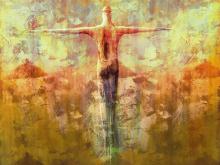dual existence

The end of the Gospel of Mark is, shall we say, indecisive. Mark’s account of the resurrection begins with the women going to anoint Jesus’ body and discovering the stone rolled away, Jesus’ body gone missing, and “a young man, dressed in a white robe” sitting in the tomb. This man tells them not to be alarmed, as if that’s possible under the circumstances, and announces that Jesus “has been raised.” The young man instructs them to go and tell the disciples that Jesus will meet them in Galilee. Really? Our dead friend is arranging a meet-up via an angel-gram? I think I’d react the same way the women do in verse 8: “they said nothing to anyone, for they were afraid.”
Here is the note that appears in my NRSV Bible at the end of verse 8, which is followed by one more verse, the so-called “shorter ending of Mark:”
Some of the most ancient authorities bring the book to a close at the end of verse 8. One authority concludes the book with the shorter ending; others include the shorter ending and then continue with verses 9-20. In most authorities verses 9-20 follow immediately after verse 8, though in some of these authorities the passage is marked as being doubtful.
I’m doubtful, too, but not because no one seems to know how the Gospel writer wanted to end his Gospel. But because doubt seems to be the reaction du jour. In the longer ending, we find out that the women break their silence, but those who are “mourning and weeping” for Jesus “would not believe it.” Mark tells us Jesus appeared to “two of them, as they were walking in the country.” But when they “told the rest,” again “they did not believe them.” This is completely understandable because resurrection cannot be considered part of normal experience, no matter what century you are living in. And yet the witnesses to Jesus’ resurrection want us to believe in the reality of it, that Jesus appeared to them and they could experience his dead-yet-aliveness, normal human beings though they were.